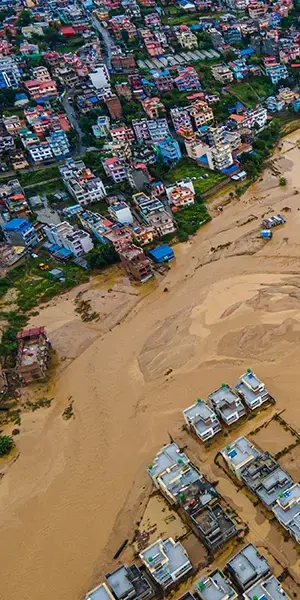(Re)in Summary
• Cyber, climate, and geopolitical risks are three of the main issues facing the insurance sector and all potentially challenge the diversification principle.
• The Geneva Association’s Jad Ariss said that the rapid pace of climate change meant that global insurers could face natural catastrophes in multiple locations in the same year.
• Geopolitical tensions are a concern for Australian regulator’s but their main focus at the moment is the impact of climate change on insurance premiums.
• APRA Board Member Suzanne Smith said a successful insurance industry was not just about ‘covering a small proportion’ of the population.
Underwriting climate, geopolitical, and cyber risk is challenging for carriers because not only are they growing risks which aren’t fully understood, they also challenge the diversification principle, according to Jad Ariss, Managing Director of The Geneva Association.
Ariss was responding to an audience poll of the most important risks facing insurers at a conference hosted by the Hong Kong Insurance Authority which selected the trio of climate, geopolitical and cyber, as the most important.
While Ariss said that he would use the term ‘geoeconomic’ instead, he agreed with the audience’s take on the key risks facing insurers, which he said posed a tough challenge for the industry.
“I’m not surprised by these results and what these three themes have in common is that they challenge one of the basic principles of insurance, which is diversification. When insurers underwrite climate risk, they do not expect that there will be floods in Asia Pacific, Europe and in North America in the same year. Or multiple wildfires in different places,” he said.
Cyber reluctance
Earlier this year AM Best said that reinsurers were ‘reluctant’ to write cyber business in Asia Pac, which in turn was hampering the development of the primary market. But Ariss said that concerns over the extent of cyber diversification were stymying the sector’s development.
“It’s getting much more difficult to diversify your risks if you’re a global insurer. This holds true for within the same region, and for cyber risk.
One of the characteristics of cyber risk is that a major cyber event impacts all sectors of the economy, and all countries, worldwide at the same time. We understand the challenge for insurers who underwrite cyber risks to manage their exposure” Ariss added.
Ariss said that he preferred the term geoeconomic risk because tensions related to supply chain disruptions during Covid and the post-pandemic trend for reshoring.
“Countries realised they were overly relying on offshore supply chains, and have since reprioritised strategic autonomy, and to reshore activities, and that is fundamentally changing the insurable risk landscape,” Ariss said.
Fellow panellist, Suzanne Smith, executive board member at the Australian Prudential regulatory Authority, agreed with the Ariss’s focus on the importance of rising geopolitical tensions for insurers.
Climate risks
Smith said that as a result APRA were introducing cross system stress tests which looked at how geopolitical risk was affecting banking, insurance and pension systems. However, she said the number one priority for the Australian insurance sector was climate change.
Last week an Australian Senate Committee released a report into how to mitigate the impact of climate change on the country which called for the monitoring of insurance premiums after the average Australian home insurance premium rose by 14% in the 2022/23 financial year.
“Australia has seen a devastating number of natural catastrophes, and significant rises in insurance premiums and to the extent that the Actuaries Institute said recently that 15% of households really can no longer afford insurance premiums,” she said.
Smith said that APRA was concerned over the potential for climate events to spur insurance repricing which leads to coverage gaps and she said that a thriving insurance sector didn’t just serve one market segment.
“What we do know is that insurance policies exposed to climate risk are typically repriced every 12 months, which does allow for rapid adjustment by insurers of premiums to account for that underlying risk. And the reality is that a successful insurance industry isn’t about stable insurers in covering a small proportion of the population.
Our focus is on trying to create a thriving insurance industry that allows people to lead their best lives because they have that access to insurance cover and so importantly, we’re encouraging transparency of insurers,” Smith said.
Hazard Insurance Partnership
Despite the strong focus on insurance pricing Smith said emphasised the issue of climate change could not be dealt with by the industry alone. She pointed to the Hazard Insurance Partnership which was set up by the Australian government in 2023 to facilitate a public/private partnership to deal with climate change.
“The Hazard Insurance Partnership is bringing the regulators, the government and the insurers, to the same table to actually look at mitigation steps to be implemented and to really try and impact how we deal with the ongoing issues of climate change,” Smith said.
While most panellists agreed with the audience’s focus on geopolitical risk, Andrew Mais, President of the National Association of Insurance Commissioners (NAIC) said that it wasn’t a priority for US supervisors.
Pointing to recent events in the Middle East he said that the number of dramatic changes occurring was ‘scary’ from the perspective of an insurance regulator and heightened the importance of solvency regimes such as the IAIS’s Insurance Capital Standard, which was recently greenlit by regulators.
























